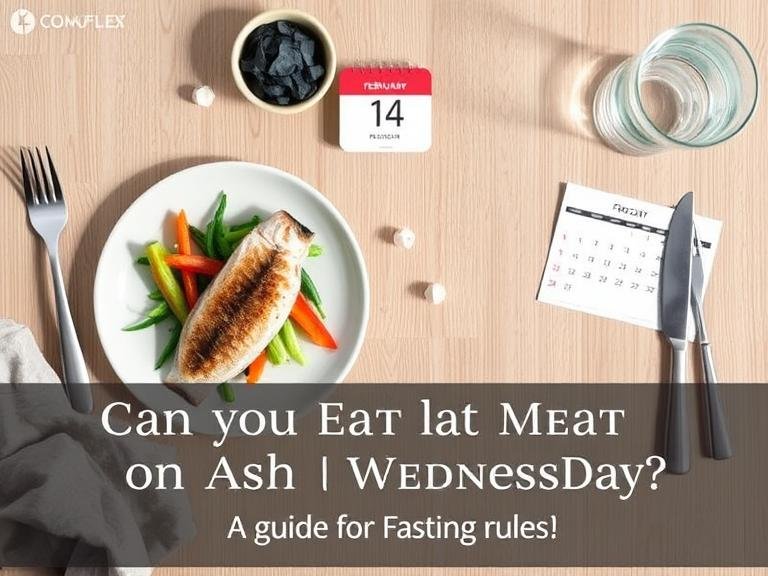Can You Eat Meat on Ash Wednesday? Ash Wednesday marks the beginning of Lent, one of the most significant periods in the Christian liturgical calendar. For millions of Catholics and other Christian denominations worldwide, this day brings important questions about dietary restrictions, particularly regarding meat consumption. Understanding the rules and traditions surrounding Ash Wednesday can help believers observe this sacred time with proper reverence and knowledge.
Table of Contents
The Simple Answer: No Meat on Ash Wednesday
For Catholics aged 14 and older, eating meat on Ash Wednesday is not permitted according to Church law. This restriction is part of the broader fasting and abstinence requirements that apply to this holy day. The Catholic Church designates Ash Wednesday as both a day of fasting and abstinence, making it one of only two such days in the entire liturgical year, along with Good Friday.
Understanding Fasting vs. Abstinence
The Church distinguishes between two types of dietary restrictions during Lent: fasting and abstinence. These terms are often confused, but they have distinct meanings and applications.
Fasting refers to eating less food overall. On Ash Wednesday, Catholics between the ages of 18 and 59 are required to fast, which means they may eat only one full meal and two smaller meals that together do not equal a full meal. No snacking between meals is permitted during fasting.
Abstinence means refraining from eating meat. This rule applies to all Catholics who have reached their 14th birthday. The abstinence requirement continues throughout Lent on all Fridays, not just Ash Wednesday.
What Counts as Meat?
When the Church refers to “meat,” it specifically means the flesh of warm-blooded animals. This includes beef, pork, chicken, turkey, lamb, and other land animals and birds. However, the definition has some important exceptions that many people find surprising.
Fish and other cold-blooded aquatic animals are not considered “meat” under Church law. This means Catholics can eat fish, shrimp, crab, lobster, and other seafood on Ash Wednesday and other days of abstinence. This exception stems from historical distinctions between different types of animal flesh and has been maintained in modern Church teaching.
The reasoning behind this distinction traces back to medieval times when fish was considered a simpler, less luxurious food compared to meat from land animals. Additionally, fish was often more readily available to common people, especially those living near water sources.
Historical Context of Ash Wednesday Restrictions
The tradition of abstaining from meat during Lent has deep historical roots in Christian practice. Early Christians viewed fasting and abstinence as forms of penance and spiritual discipline, helping believers prepare for Easter through self-denial and increased prayer.
Ash Wednesday itself became established as the official beginning of Lent in the Western Church by the 8th century. The ashes used on this day, traditionally made from burning the previous year’s Palm Sunday palms, symbolize mortality and repentance. The phrase “Remember that you are dust, and to dust you shall return” accompanies the imposition of ashes, reminding believers of their need for spiritual renewal.
The 40-day Lenten period (not counting Sundays) mirrors Jesus Christ’s 40-day fast in the wilderness before beginning his public ministry. This connection makes the dietary restrictions during Lent particularly meaningful for Christians seeking to follow Christ’s example of sacrifice and spiritual preparation.
Exceptions and Special Circumstances
While the Church maintains clear rules about meat consumption on Ash Wednesday, certain exceptions exist for those who cannot observe these restrictions due to health or other serious reasons.
People with medical conditions that require specific dietary needs may be exempt from fasting and abstinence rules. This includes individuals with diabetes, eating disorders, pregnant or nursing women, and those taking medications that require food consumption. The elderly and young children are also exempt from strict fasting requirements.
Additionally, when Ash Wednesday falls on a day that would normally be a feast day or solemnity in the Church calendar, the bishops may provide guidance on how to observe both occasions appropriately. However, this situation is relatively rare due to the way the liturgical calendar is structured.
Alternative Forms of Penance
For those who cannot abstain from meat due to legitimate reasons, the Church encourages alternative forms of penance. These might include additional prayers, charitable works, giving up other foods or activities, or increasing acts of service to others.
The goal of Lenten observance is spiritual growth and preparation for Easter, not simply rule-following. Therefore, the Church recognizes that the spirit of penance can be maintained through various means when traditional fasting and abstinence are not possible.
Modern Applications and Practical Considerations
In today’s diverse society, observing Ash Wednesday restrictions can present practical challenges. Many Catholics work in environments where meal options are limited, or they may have family members who don’t observe these traditions. Planning ahead can help ensure successful observance of the day.
Preparing fish-based meals, researching restaurant menus in advance, and communicating with family and friends about dietary needs can make Ash Wednesday observance more manageable. Many restaurants and cafeterias now offer special Lenten menus during this season, recognizing the needs of their Catholic customers.
It’s also worth noting that different Christian denominations may have varying approaches to Lenten observance. While Catholic rules are quite specific, Orthodox Christians follow different fasting calendars, and many Protestant denominations encourage individual choice in Lenten practices rather than mandating specific dietary restrictions.
The Spiritual Significance Beyond Dietary Rules
While understanding the technical aspects of what can and cannot be eaten on Ash Wednesday is important, the deeper purpose of these restrictions should not be overlooked. The temporary sacrifice of meat serves as a reminder of the greater sacrifice made by Jesus Christ and encourages believers to focus on spiritual rather than physical nourishment.
The discipline required to observe these dietary restrictions can strengthen willpower and increase mindfulness about consumption habits. Many Catholics report that Lenten fasting helps them develop greater appreciation for food and increases their awareness of those who go without adequate nutrition.
Furthermore, the money saved by not purchasing meat can be donated to charitable causes, connecting the personal sacrifice to service for others. This practice, known as almsgiving, is one of the three traditional pillars of Lent, along with fasting and prayer.
Frequently Asked Questions
Q: Can I eat chicken broth or soup made with meat on Ash Wednesday? A: Foods made with meat products, including broths, gravies, and soups containing meat, should be avoided on Ash Wednesday. However, seasonings and flavorings derived from meat are generally acceptable in small amounts.
Q: What if I accidentally eat meat on Ash Wednesday? A: Accidental consumption of meat does not constitute a sin, as the Church requires both knowledge and intent for a violation to occur. If you realize your mistake, simply continue observing the day appropriately.
Q: Do eggs and dairy products count as meat? A: No, eggs, milk, cheese, and other dairy products are not considered meat under Church law and are permitted on Ash Wednesday.
Q: Can I eat meat if Ash Wednesday falls on a major holiday? A: The Ash Wednesday restrictions remain in place regardless of secular holidays. The Church calendar takes precedence over civil celebrations.
Q: What about gelatin and other animal by-products? A: Products like gelatin, which are derived from animals but are not flesh themselves, are generally considered acceptable during abstinence days, though some Catholics choose to avoid them as a matter of personal devotion.

